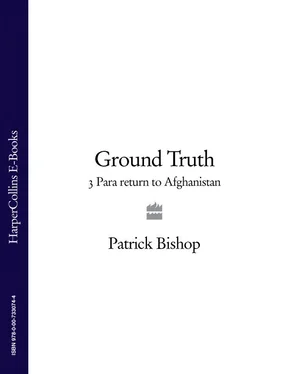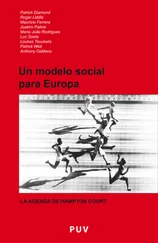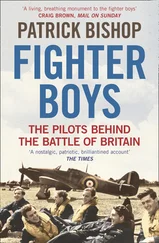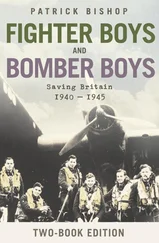2 Through the Looking Glass
On the morning of Monday 3 March 2008, a cold, blustery day on which spring seemed far away, the headquarters party of the Third Battalion of the Parachute Regiment arrived at Brize Norton airbase to await the RAF flight that would take them to Kandahar and a new Afghan adventure. The departure lounge was crowded with men and women from all branches of the British services. They sat hunched in what little pockets of privacy they could find, making a last call on their mobiles or stretched out on the carpet catching up on sleep. Brize was where they passed through the looking glass. On one side lay the muddy pastures and bare trees of Oxfordshire. On the other, the mountains, deserts and poppy fields of Helmand. The physical journey was nothing compared to the psychological distance they were about to travel. Here there was security and comfort. Beyond lay a realm of fear, danger and hardship.
Many of the Paras who flew out during the following days had taken part in the great events of the summer of 2006. In the eighteen months they had been away, though, much had changed. The 3 Para Battlegroup had written the opening chapter of Britain’s latest Afghan war. But the plot had moved on and the shape of the action had altered. The battalion looked different too. The Paras had a new colonel and a changed cast of characters. Four out of ten of the veterans of the last tour had left, having quit the army or transferred to other units. They also had a new role that would require skills other than the sheer fighting ability that had sustained them last time.
The battalion was now led by Huw Williams, a lean, relaxed Welshman. He inherited a unit that was still preoccupied with its recent history. The 2006 tour had already entered military folklore, and if some of the prominent original players had departed, their ghosts still lingered on.
Williams had taken over from Stuart Tootal, a complex figure who had sublimated himself in the drama of the campaign, reacting emotionally to its triumphs, crises and setbacks and taking each death and injury as a personal tragedy. His demanding personality had made him a few enemies among his senior officers. There were many more, though, who admired and respected him.
Tootal’s two-year command period ended in November 2007. Early in 2008 he announced he was leaving the army. The news came as a surprise. His bosses thought highly of him and he was assumed to be on a rising path that could take him to the upper reaches of of the army. Tootal was close to several influential journalists. He used his departure to publicise what he said were serious failings in the way the government equipped the men they sent to war and the shameful treatment the wounded received when they returned home. Out of uniform he continued to speak out as a part-time media commentator, which he combined with a top job at Barclays Bank.
To some, his decision to leave was easy to understand. Nothing could ever match the prestige of commanding an elite unit like 3 Para on the most intense operation it had faced since the Falk-lands War. Tootal told friends that if he had continued his army career, subsequent postings were unlikely to come close to matching the excitement and satisfaction he found in Helmand, no matter how far up the ladder he climbed.
Tootal was still commanding 3 Para when it was announced that the battalion would be returning to Afghanistan in the spring of 2008 for Operation Herrick 8. The Paras would be playing a multiple role. Their main function was to act as the rapid reaction force for the NATO commander of southern Afghanistan, going wherever he thought they were needed. But they were also expected to work with 16 Air Assault Brigade, their parent formation, which was deploying at the same time in Helmand.
During early planning meetings for Herrick 8, the brigade got used to the battalion harking back to the experiences in Herrick 4. ‘There was a feeling in 16 Brigade that…3 Para were a backward-looking organisation who only wanted to talk about Herrick 4 and didn’t want to look forward,’ said an officer. ‘Everything [the Brigade] tried to do or talk about was greeted with “well, on Herrick 4 it was like this” and “of course, you don’t understand what it’s like”. The battalion wasn’t overly popular and there was a feeling that they were pulling in a different direction.’
Huw Williams knew as much as anyone about Herrick 4. He had been 3 Para’s second-in-command during the tour, carrying the unglamorous responsibility of keeping the battalion machine running while the colonel got on with the exhausting but exhilarating job of command. But he felt it was time to let the experience go. He was determined that the shadows cast by the legends of 2006 would not obscure the new tasks and changed circumstances facing him and his men. After taking over in November 2007 he told his men that Herrick 4 belonged to the glorious past. Everyone was to look ahead and prepare for a different situation and different role.
The British Army had gone to Helmand in 2006 with only the sketchiest plan, which had been erased by the first contact with reality. They had been sent to a place which most soldiers regarded as being of only peripheral strategic importance. Once there, they were soon stuck with it, enmeshed in a process whose direction they were unable to control. 3 Para Battlegroup was supposed to create a climate of stability in a small area around Helmand’s provincial capital, Lashkar Gah, in which development and reconstruction work could begin. Instead they found themselves riding to the rescue of the Afghan government whose thinly spread forces were under attack from the Taliban. Their area of operations expanded out of the original triangle bounded by Lashkar Gah, the town of Gereshk and the Camp Bastion logistics base to the northern settlements of Sangin, Musa Qaleh and Now Zad.
In the process they became the main targets of the Taliban and sank into an intense attritional slog that lasted throughout the summer. The conflict was later presented officially as the ‘break in battle’, the fighting that has to be done to establish a force in-theatre. But the term was a post facto justification and no such exercise had been envisaged when the soldiers set out. The break in battle decided nothing. The Paras, in the judgement of one of their senior officers, were intent on ‘just surviving’. It was exhaustion which eventually brought the fighting to a close, and the welcome onset of winter.
When spring came the Taliban re-emerged to face a new British force. The Paras had been succeeded by 3 Commando Brigade. They were relieved in turn six months later by 12 Mechanised Brigade. Then in October 2007 their place was taken by 52 Infantry Brigade.
By the spring of 2008 there was an established pattern to the annual fighting cycle. The Taliban remained relatively inactive during the winter. The conditions were against them. Life in the open was harsh and miserable. The fields in the fertile valley floors were bare and provided no cover from which to launch attacks. They used the time to stay in their home villages and rest, or travel to their hinterland across the border in Pakistan to recruit and resupply and confer with their high command sitting safely in the border town of Quetta. By late spring they were busy again, not fighting but farming. The most important task was to harvest the poppies that dance in the breeze in the opium fields covering southern Helmand. The milky sap that oozed from the bulbs was the main source of wealth in the local economy. It was the fuel that powered the insurgency. Some of the fighters grew poppies themselves. The others earned the approval of the peasants by working alongside them in the fields. Once the crop was gathered in, the Taliban took their cut of the profits, using the revenue to pay wages and buy weapons.
Читать дальше












